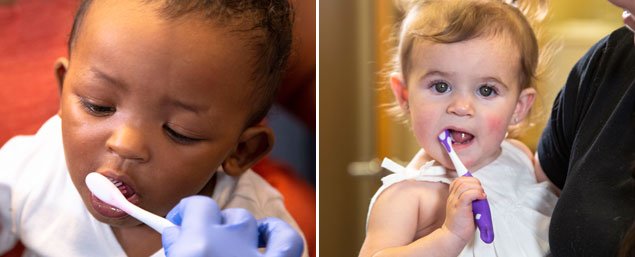





To make sure that kids’ teeth start healthy and stay healthy, a dentist should see them as soon as their first tooth appears. This first visit gives families a chance to ask questions, and it helps babies start to recognize the dentist and dentist office as a nice place with nice people. It also gives the dentist a chance to make sure that a baby’s teeth and mouth are healthy.
Healthy teeth allow babies to chew food and talk. They also help shape a baby’s face and hold open spaces for adult teeth to grow in—adult teeth are bigger than baby teeth, so they need lots of space. When families take care of a baby’s teeth by brushing at home and going for checkups at the dentist, dental visits become a way to prevent cavities instead of just treating them when they happen.
You can help your clients find a dentist who sees very young children by encouraging them to ask their pediatrician for a referral. They can also call their dental insurance company or health insurance company to ask for help. Once your client has identified a good dentist, they can call to schedule an appointment during a time of day when their child is usually rested and cooperative. Remind parents and caregivers that it’s ok to ask the receptionist as many questions as they may have about the visit so they’ll know what to expect.
For information to help families find a dentist, please click here.
Perhaps the most important thing parents can do to make sure the visit goes smoothly, is to make sure their child knows that the dentist’s office is a safe place. If parents are nervous about the visit because of some experiences they may have had themselves, their child will pick up on it and be nervous too. Try to help families understand that staying calm and positive is one of the most important things they can do to prevent their child from being fearful.
Children experience many “firsts” in their young lives. They take their first steps, speak their first words, and go for a first haircut. The first dental visit is just one of the many things a baby will do for the first time, and there is a good chance it will be an enjoyable experience.
There are many things families and caregivers can do to help kids understand what’s going to happen and make them feel more comfortable during the first dental visit.
If they suspect that their child would do better by visiting and taking a tour of the office first, families can call to schedule a pre-visit to help the child get used to the sights, sounds and smells of the dental office before the actual appointment.
A baby’s first visit to the dentist is not like when adults visit the dentist. It will be more like visiting a regular doctor. Usually, a child will sit in a parent’s lap while the dentist looks inside her mouth for early signs of cavities. The dentist may need a better look and ask to sit knee-to-knee with the child’s loved one with the baby her loved one, and then lean the baby back so that her head is on the dentist’s lap. This will allow parents to make eye contact and hold hands with the baby so she feels secure.
Some babies fuss and won’t sit still during their exam, and that’s ok. Parents should not be embarrassed at all. The dentist and dental hygienist understand children and will be very gentle, patient, and encouraging with the child. With each visit, children get used to going to the dentist and will be more relaxed as they gain experience.
When the exam is over, the dentist or dental hygienist may do a gentle cleaning or take an x-ray of the baby’s mouth. The dentist will also spend time talking to caregivers about foods and drinks that are healthy for teeth, good brushing habits, use of fluoride, the potential need for fluoride varnish, and answer any questions caregivers might have about the baby’s oral health.
At the end of the visit, the dentist will make a recommendation for a return visit. This may be every six months or so depending on the child’s needs. The whole visit should take only about 15 to 30 minutes.
For more information for families on what to expect for a first dental visit, please click here.
It may be helpful for your client to have a list of questions. Here are some questions they might want to ask:
Cavities are preventable with a healthy diet and daily brushing, but that’s not enough. Babies also need to see the dentist by their first birthdays to make sure that they’re creating healthy smiles for a lifetime.
It takes a community of people working together to keep our little ones healthy. Help put a child on the road to a lifetime of good oral health today!
